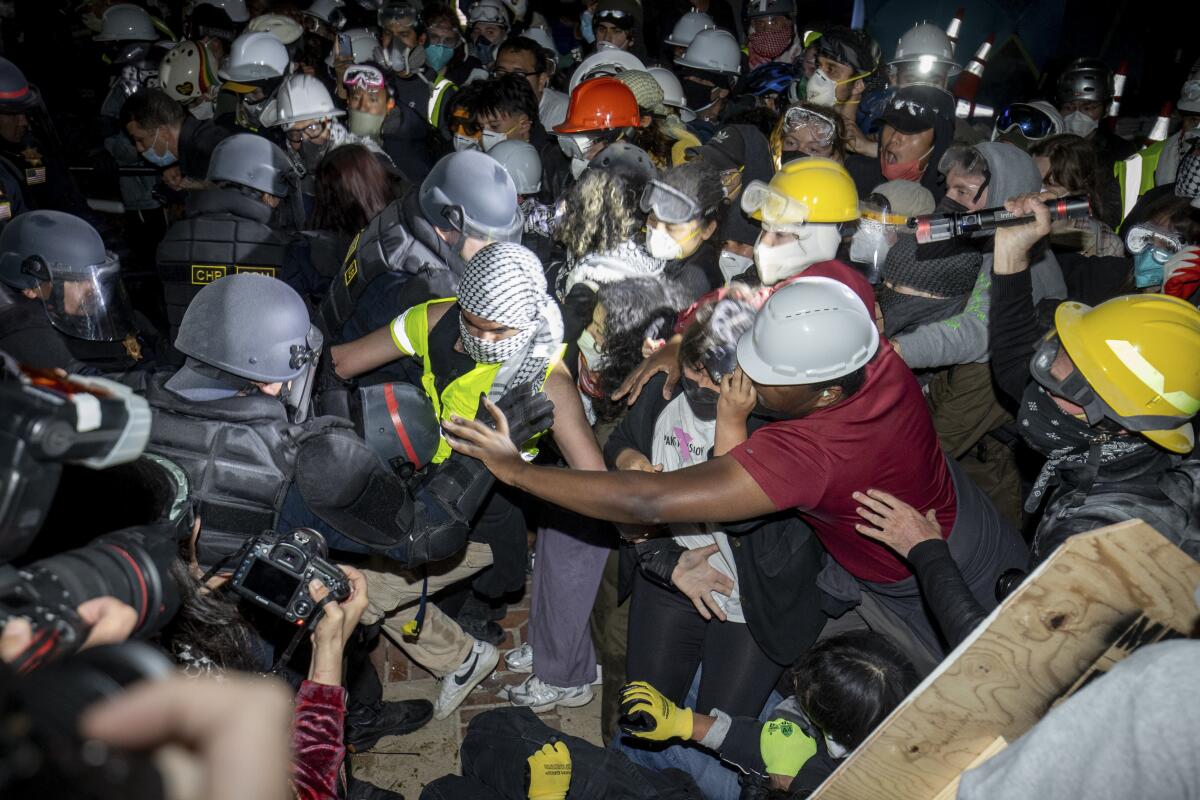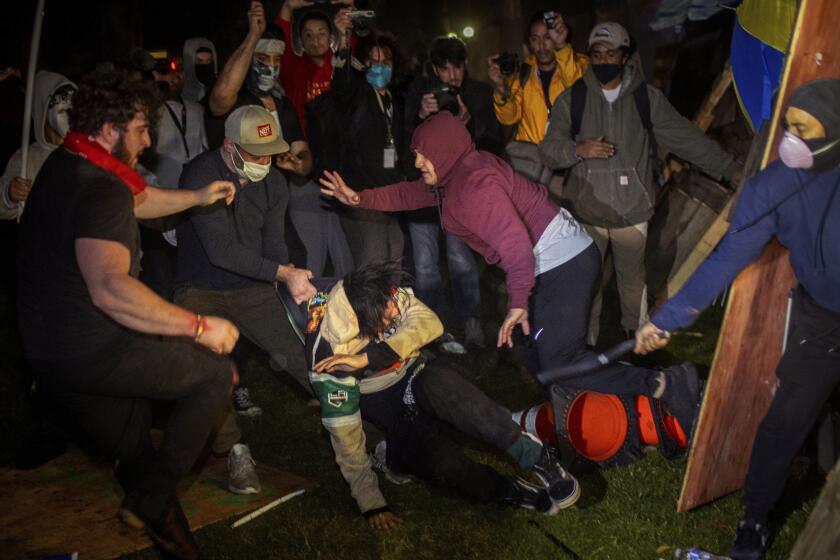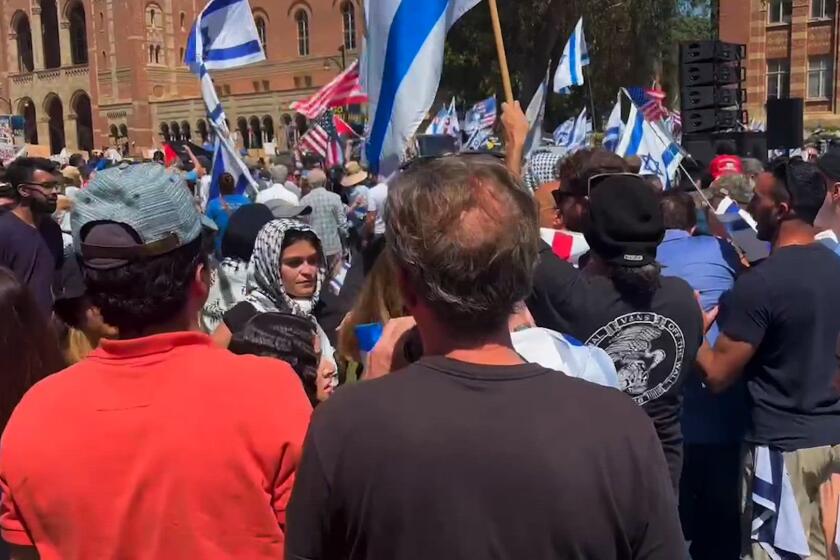Police have arrested nearly 2,000 on college campuses since protests started

Police arrested pro-Palestinian protesters on college campuses across the country overnight, with officers in riot gear surging against crowds of demonstrators.
Tent encampments of protesters calling on universities to stop doing business with Israel or companies they say support the war in Gaza have spread across campuses nationwide in a student movement unlike any other this century. The ensuing police crackdowns echoed actions decades ago against a much larger protest movement protesting the Vietnam War.
Demonstrations — and arrests — have occurred in almost every corner of the nation. At least 1,945 people have been arrested since the protests began at Columbia University in New York on April 18.
They included a college professor from Illinois who said he suffered multiple broken ribs and a broken hand during a pro-Palestinian protest on Saturday at Washington University in St. Louis.
Bystander video shows the arrest of Steve Tamari, a history professor at Southern Illinois University Edwardsville. He seems to be moving in to take video or photos of protesters being detained when multiple officers roughly take him down.
Tamari said in a statement Thursday that it was “a small price to pay for Israel’s ongoing genocide in Gaza.”
Less than 24 hours after a violent attack on a pro-Palestinian camp at UCLA, officers pulled apart barricades as they tore down the encampment and made arrests.
Officials at New York’s Stony Brook University on Long Island said 29 people were arrested early Thursday, including students, faculty and others “from outside our campus community.” In New York City, Fordham University officials said 15 people were arrested after pushing inside the lobby of a building on the school’s campus at Lincoln Center.
The New York Police Department arrested 15 people late Wednesday on accusations of misdemeanor trespassing after several dozen people pushed inside the lobby of the Lowenstein building at Fordham University’s campus at Lincoln Center.
Seventeen people were arrested on criminal trespass charges Wednesday at the University of Texas at Dallas after demonstrators refused to comply with law enforcement orders to remove an encampment from the school’s main walkway, a university spokeswoman said in a statement Thursday.
Yale University police arrested four people, including two students, Wednesday night after around 200 demonstrators marched to the school president’s home and the campus police department, school officials said. Protesters ignored repeated warnings that they cannot occupy parts of campus without permission, school officials said in a statement Thursday.
The protest group Occupy Yale said campus police were violent during the arrests and did not issue warnings. The group posted a video on Instagram showing officers taking one person to the ground and pinning another to a sidewalk.
“A peaceful protest,” Occupy Yale said. “Police officers seized, pushed, and brutalized people. Is this what you call keeping campus safe?”
Tent encampments of protesters calling on universities to stop doing business with Israel or companies that support the war have spread nationwide.
In Oregon, police began to clear pro-Palestinian rights demonstrators out of the Millar Library at Portland State University, which they have been occupying since Monday.
They spray-painted graffiti inside and knocked over or piled up furniture to create barricades. Portland State said on social media Thursday that the campus would remain closed because of the police activity.
University President Ann Cudd said Wednesday that about 50 protesters vacated the library after administrators promised not to seek criminal charges, expulsion or other discipline if they left peacefully, but others — including nonstudents — remained. Portland police said Thursday that 15 police vehicles were set on fire overnight; it was not immediately clear whether the fires were related to the protest.
University of Minnesota officials reached agreement with protesters to end an encampment on the Minneapolis campus. Interim President Jeff Ettinger said in an email Thursday to the campus community that protesters agreed not to disrupt final exams or commencement ceremonies. That followed similar agreements at Northwestern University in suburban Chicago and Brown University in Rhode Island.
Florida’s state university chancellor has ordered campus presidents to take whatever steps necessary to prevent disruption of graduation ceremonies, including at large schools such as the University of Florida and Florida State University.
Photos: Clashes erupt at pro-Palestinian demonstrations on California campuses
Protests also sprung up off campuses. In Albuquerque on Thursday, about two dozen protesters sat in the middle of a roadway blocking access to a main gate at Kirtland Air Force Base. The group waved flags and vowed to “shut everything down” over the ongoing war in the Gaza Strip.
The protests at UCLA appeared to be getting the most attention. Iranian state television carried live images of the police action, as did Qatar’s pan-Arab Al Jazeera satellite network. Live images of Los Angeles also played across Israeli television networks.
President Biden on Thursday defended the students’ right to peaceful protest but decried the disorder of recent days.
Israel has branded the protests antisemitic, while Israel’s critics say it uses those allegations to silence opposition. Although some protesters have been caught on camera making antisemitic remarks or violent threats, protest organizers — some of whom are Jewish — call it a peaceful movement to defend Palestinian rights and protest the war.
Police cleared protest encampments at other schools across the U.S., resulting in arrests, or they were closed voluntarily. In New York, those included the City College of New York, Fordham University, Stony Brook University and the University of Buffalo. Others included the University of New Hampshire in Durham, Northern Arizona University in Flagstaff, and Tulane University in New Orleans.
On Tuesday night, police burst into a building occupied by war protesters at Columbia University, breaking up a demonstration that had paralyzed the school.
Pro-Israel and pro-Palestinian demonstrators clash Sunday at UCLA, one day after protests erupted again at USC, where 93 people were arrested last week.
Columbia’s chapter of the American Assn. of University Professors condemned the school’s leadership on Thursday for asking New York police to remove the protesters. The chapter said “the horrific police attack on our students” is now “shamefully on view for the whole world to see.”
At the University of Wisconsin in Madison, a scrum broke out early Wednesday after police with shields removed all but one tent and shoved protesters. Four officers were injured. Four people were charged with battering law enforcement.
The nationwide campus demonstrations began at Columbia on April 17 to protest Israel’s offensive in Gaza after Hamas’ deadly attack on southern Israel on Oct. 7. Militants killed about 1,200 people, most of them civilians, and took roughly 250 hostages. Vowing to stamp out Hamas, Israel has killed more than 34,000 Palestinians in the Gaza Strip, according to the Health Ministry there.
U.S. college campuses have become a flash point, with school leaders facing intense scrutiny over their handling of allegations of antisemitism and the right to free speech. The presidents of Harvard and the University of Pennsylvania resigned following questions at a congressional hearing about whether calls on campus for the genocide of Jews would violate the school’s conduct policy.
Pearson, Swope, Offenhartz and Frederick write for the Associated Press. Offenhartz and Frederick reported from New York. AP journalists Julie Watson, Krysta Fauria, John Antczak, Christopher L. Keller, Lisa Baumann, Stefanie Dazio, Jae C. Hong, Colleen Long, Karen Matthews, Sarah Brumfield, Carolyn Thompson, Philip Marcelo, Steve Karnowski and Eugene Johnson contributed to this report from around the U.S.
More to Read
Sign up for Essential California
The most important California stories and recommendations in your inbox every morning.
You may occasionally receive promotional content from the Los Angeles Times.













